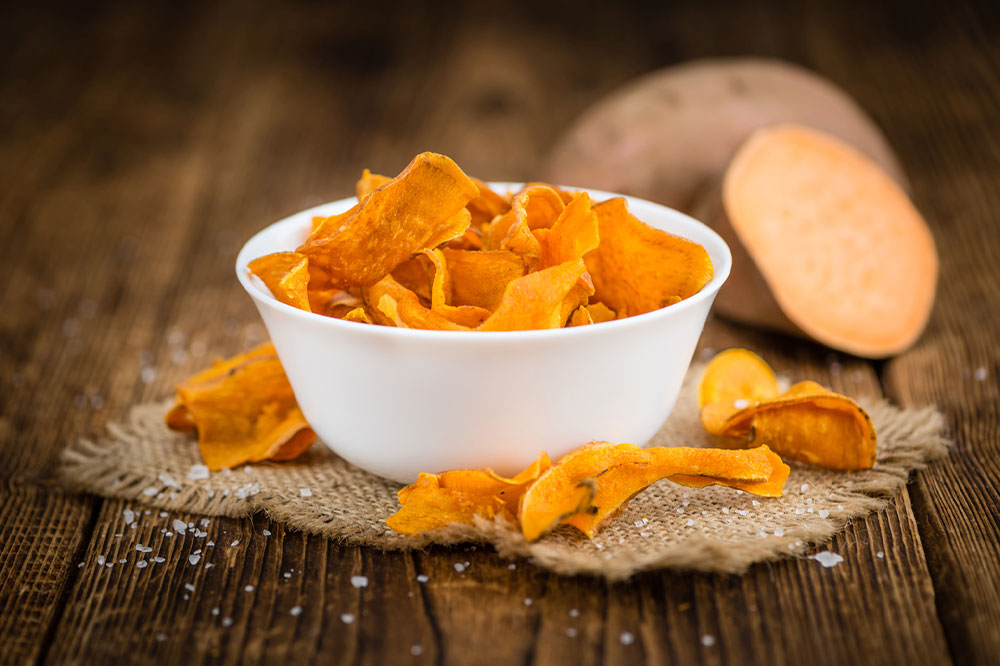
Top 12 Foods for Increasing Potassium Intake
Potassium is a vital mineral that contributes to numerous bodily functions, including muscle contraction, nerve transmission, and fluid balance. That’s why adequate potassium intake is important for maintaining optimal health and preventing unwanted complications. When dealing with a deficiency of this mineral, one should incorporate potassium-rich foods into their daily meals to meet daily nutrient requirements. One should also recognize the symptoms of this deficiency to increase their potassium intake.
Top potassium-rich foods
Potassium is an essential mineral that plays a crucial role in maintaining bodily functions, including nerve and muscle function, fluid balance, and blood pressure regulation. It also helps maintain a healthy heart rhythm and can reduce the risk of stroke, kidney stones, and osteoporosis. Here are some of the best sources of this nutrient one can find:
Sweet potatoes
Sweet potatoes are an excellent source of potassium, fiber, and essential vitamins. One medium-sized sweet potato can provide about 542 mg of potassium. So, sweet potato is a great option for maintaining healthy blood pressure and cardiovascular health through high potassium intake.
Spinach
Spinach is a highly nutritious leafy green vegetable packed with vitamins, minerals, and antioxidants. One cup of cooked spinach provides about 839 mg of potassium. Regular intake helps regulate the fluid balance in the body and maintain muscle and nerve function.
Avocado
Avocado is a nutrient-dense fruit containing potassium, healthy fats, and fiber. One medium-sized avocado contains about 708 mg of potassium. The high potassium content helps maintain healthy blood pressure and reduce the risk of stroke.
Acorn squash
Acorn squash is a winter squash rich in potassium, fiber, and essential nutrients. One cup of cooked acorn squash provides about 896 mg of potassium and helps support healthy muscle function and prevent muscle cramps.
Salmon
Salmon is a great source of omega-3 fatty acids and potassium. Experts suggest that a 3-ounce serving of cooked salmon provides about 416 mg of potassium. The high potassium content is essential for maintaining healthy heart function.
White beans
White beans are a type of legume rich in potassium, protein, and fiber. One cup of cooked white beans has about 829 mg of potassium, essential for maintaining healthy blood pressure and preventing heart disease.
Banana
Bananas are a common fruit rich in potassium, fiber, and essential vitamins. One medium-sized banana contains about 422 mg of potassium. As a result, banana helps maintain healthy fluid balance and prevent muscle cramps.
Yogurt
Yogurt is a great dairy product rich in protein, calcium, and potassium. A cup of plain yogurt contains about 573 mg of potassium. So, regular intake of yogurt can help promote healthy heart and nerve function, along with helping maintain a healthy gut.
Beet greens
Beet greens are the leafy tops of beetroot that are rich in potassium, fiber, and essential nutrients. One cup of cooked beet greens contains about 655 mg of potassium. So, this food item is great for healthy muscle development.
Dried apricots
Dried apricots are a sweet and easy snack rich in potassium, fiber, and essential vitamins. A cup of dried apricots contains about 1,511 mg of potassium.
Tomato
Tomatoes are a common fruit rich in potassium, vitamin C, and antioxidants. A medium-sized tomato contains about 292 mg of potassium to maintain a healthy fluid balance and prevent muscle cramps.
Lentils
Lentils are a type of legume rich in potassium, protein, and fiber. One cup of cooked lentils provides about 731 mg of potassium, essential for maintaining healthy blood pressure and preventing heart disease.
Excessive potassium intake can also be dangerous, especially for those with kidney disease or other conditions. At the same time, meeting the daily potassium requirement is important to avoid health risks.
Symptoms of potassium deficiency
While many foods contain potassium, including bananas, spinach, and sweet potatoes, some people may not get enough of the nutrient from their daily meals. A potassium-deficient meal plan can result in hypokalemia, which can cause various symptoms. Here are some common symptoms one can experience:
Muscle weakness: High potassium intake can help ensure optimal muscle functioning. So, potassium deficiency can cause muscle weakness, especially in the arms and legs, and can make it difficult to perform everyday tasks, such as walking, lifting, or even holding objects.
Cramping: Low potassium levels in the body can also cause muscle cramping, particularly in the legs and feet. The symptom can be especially painful and interfere with daily routine.
Fatigue: Fatigue is a common symptom that can worsen if left untreated or overlooked. The body needs potassium to convert food into energy; otherwise, the body lacks the energy to do essential tasks.
Constipation: The mineral is essential for maintaining digestive function. Optimum potassium levels help regulate the body’s fluid balance, while low levels can slow down the digestive system and cause constipation.
Irregular heartbeat: Potassium is vital for optimal heart function, so a severe deficiency of this nutrient can cause an irregular heartbeat or arrhythmia. Besides, it can be especially dangerous for people with pre-existing heart conditions.
Tingling sensation or numbness: One may experience tingling or numbness in the hands and feet as a common symptom. This is because potassium is required for transmitting nerve impulses required for various body functions.
Mood changes: Severe deficiency can increase the risk of depression, anxiety, and irritability. This essential nutrient regulates the balance of fluids in the body, and when this balance is disrupted, it affects brain function.
If one suspects they are not getting enough potassium through daily meals and notice any of the above symptoms, they should consult a doctor to get a proper diagnosis. They can perform tests to determine the potassium levels and may recommend specific foods and supplements to meet the daily potassium requirement. One should also consult a doctor if they are experiencing symptoms such as muscle weakness or irregular heartbeats or if they are dealing with an illness that affects potassium levels, such as kidney disease or diabetes.





